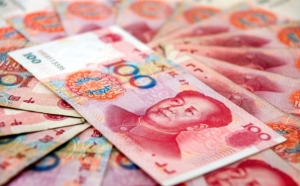China Banking Research
Opportunities and challenges for China in green finance
In the fourth quarter of 2023, China emerged as the top green bond market globally. Sales of internationally aligned green bonds in China reached US$21.83 billion in the final three months of 2023, up 131% on a quarterly basis, according to the Climate Bonds Initiative data. This was well ahead of the No. 2 market, the U.S., which had green bond sales of US$12.87 billion and No. 3 Germany, which recorded sales of US$7.14 billion.
RMB internationalization made quiet progress in 2023
Internationalization of China’s currency has moved more slowly than many analysts had expected. The renminbi remains far behind not only the dollar but also the euro as a reserve currency, and several percentage points behind the both Japanese yen and pound sterling in that area. However, when it comes to payments, China’s currency has done better of late. From January 2023 to October 2023, its share of cross-border payments jumped from 1.9% to 3.6%, according to the International Monetary Fund (IMF).
When will Ant Group’s transformation be complete? Once China’s and probably the world’s most prominent fintech firm, the company has been caught up in political and regulatory headwinds since November 2020. Each time the light at the end of the tunnel has seemingly been in view, the expected revival of its IPO – the only definitive signal that would signal the company were out of the woods – has failed to materialize. Recent moves by Ant Group suggest that it still has some work to do before its transition to a technology company that works for the national interest is complete. That seems to be what Beijing expects of Ant.
Why the digital RMB remains a curiosity
Since China unveiled the digital renminbi several years ago, it has been hyped as a juggernaut that would dethrone the dollar in the international financial system while relegating China’s domestic e-payments duopoly of Alipay and Tenpay to supporting roles. The digital yuan’s biggest boosters – usually not Chinese policymakers – made such predictions without offering compelling evidence to support their arguments.
China aims to become a leader in green finance
China is currently the world’s largest emitter of greenhouse gases, accounting for nearly 1/3 of the global total. Beijing is well aware of the effect its emissions have on climate change and has pledged to be carbon neutral by 2060, with emissions peaking in 2030.
Renminbi internationalization gains momentum
2023 has been an eventful year for renminbi internationalization thus far with China striking deals with several different countries to increase trade settlement in the Chinese currency. The renminbi seems destined to become increasingly important in international trade. While some of the media attention given to these deals would suggest they herald a broader de-dollarization movement, the reality is more nuanced.
At the recent meetings of its National People’s Congress and Chinese People’s Political Consultative Conference, known as the two sessions, China made important changes to its financial and technology regulations to address significant challenges at home and overseas. Beijing is intent on ensuring financial stability at home and achieving breakthroughs in so-called “chokepoint technologies” as it deals with an increasingly fraught relationship with the United States.
One lingering question remains though: Will China’s dynamic private sector be sufficiently empowered by the reforms?
Ant Group is nearly out of the woods
Two years and 2.5 months after its IPO was shelved at the 11th hour, Ant Group appears to be nearly out of the woods. Ant has jumped through countless hoops for regulators over the past few years, from creating a dedicated consumer finance unit to raising its capitalization to agreeing to share consumer data with the People’s Bank of China (PBoC) to having Jack Ma give up control of the company – more on that later. So it is no surprise that with the Chinese economy faltering, battered by zero Covid and then the abrupt shift to living with the virus, that regulators are ready to put China’s tech crackdown in the rearview mirror.
Targeted renminbi internationalization is feasible
China embarked on a quest to internationalize its currency in the early 2010s with great fanfare. In support of renminbi internationalization, Beijing announced plans to develop Shanghai as a global financial center and established offshore yuan trading hubs in Hong Kong, Singapore and London.
These efforts represented a push by reform-minded officials to give China a greater role in international finance and activate needed changes to a financial system designed for a country less integrated with the global economy. They came about at a time when it was widely assumed that China’s leadership believed the advantages of a more open financial system outweighed the drawbacks, and that a free-floating renminbi and fully convertible capital account were not a question if, but when.
China's fintech giants diminished by crackdown, but still formidable
China’s fintech sector was never the same after November 3, 2020. That was the day Chinese regulators abruptly nixed Ant Group’s mega IPO, a dual Shanghai and Hong Kong listing that was expected to raise US$37 billion and value the Chinese fintech giant at a whopping US$315 billion. The cancellation of Ant’s IPO proved to be the beginning of an extended campaign to curb the dominance of Big Tech in China’s financial services industry.
More...
Assessing the state of renminbi internationalization
Given the ever-more complex geopolitical situation, it is well worth examining the state of renminbi internationalization. Lofty goals mooted in the early 2010s, such as a free float of the Chinese currency, and full convertibility of the capital account, seem out of reach for the foreseeable future. Nor is the renminbi becoming a dominant global reserve currency. Rather, its use is rising in specific use cases, such as bilateral trade settlement, often due to geopolitical considerations.
Hong Kong’s evolving role as a financial center
In the past three years, Hong Kong has faced unprecedented challenges that have brought into question its future as a financial center. Strict adherence to a zero-Covid policy has been particularly impactful. The inability of businesspeople to freely travel to and from Hong Kong has adversely affected the city’s business environment. Still, in certain respects, Hong Kong is continuing to thrive as a financial center.
China has been cracking down on fintech in one form or another since September 2017 when it set out to clip the wings of its then flourishing cryptocurrency industry. Next up on the chopping block was peer-to-peer (P2P) lending. Both industries are shells of their former selves, which suits Beijing just fine given their risk profiles. However, the crackdown on China’s systemically important tech companies has had ripple effects in the broader economy and China’s leadership recently signaled that a change of direction may be near.
How is renminbi internationalization evolving?
Internationalization of the renminbi has taken a different path than what seemed likely when the process began in the early 2010s. At the time, many observers expected China would gradually open its capital account and allow its currency to float freely. These steps were seen as integral for China to achieve a commensurate status in the international financial system that it already enjoys in the global economy. Yet political considerations have increasingly outweighed financial ones, and renminbi internationalization is instead evolving inside a less open ecosystem than expected.














